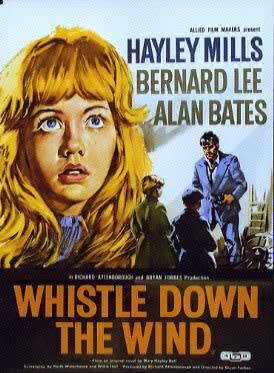
WHISTLE DOWN THE WIND
UK, 1962, 100 minutes, Black and white.
Hayley Mills, Alan Bates Bernard Lee, Roman Bird, Alan Barnes, Ray Holder.
Directed by Bryan Forbes,
Whistle Down the Wind is an unusual film about children and childhood. It is based on a novel by Mary Hayley Bell (Mrs. John Mills) and Hayley Mills' mother. Its theme is religious in a complex way and arguments could be offered for its being anti-religion as well as pro-religion.
Three children mistake an escaped murderer for Jesus Christ and treat him as Christ. This exploration of Christianity and its beliefs is done from the children's rather literal view of the message of the Gospels and contrasted with the attempts of formal religion and adults, especially the vicar, to preach Christ's charity. On the other hand, the children's faith has little basis, because the convict is not Christ. Their religion is sincerely subjective but with an unreal foundation. Part of the complexity comes from the criminal as a Christ-figure - a hunted criminal drawing people to himself or a man forced to act as God. The final sequence of his surrender may hold the key to this.
The film is an excellent picture of English provincial country life; photography, acting are excellent and the film offers us the young Hayley Mills at her best. Thoughtful, humorous and sad entertainment.
1. How did the black and white photography contribute to the mood of the film? Would it have softened the impact had the film been in colour? How?
2. How did the English provincial setting, accent, idiom, manners, style, contribute to the flavour of the film? Did the dingy country side and the cliffs and mountains play a part in the film?
3. Did you like the children when you first met them? Why? Were they typical - in their reactions to one another, in saving the kittens, in their relationship to their father and Auntie, in life on the farm?
4. How did the Salvation Army sequence prepare for the main -theme?
5. Was it credible that these children would believe that a convict who profaned Christ's name could be Jesus? Why did they? Alan Bates was photographed in Christ profiles and postures. What effect did this have on the audience? How authentic Was the children's reactions to Jesus - miracles, reverence, absolute belief, secrecy to adults but not to friends, knowing that Jesus was a persecuted man? Comment an the mood of the music as it incorporated the Magi hymn "We Three Kings" into the children's joy.
6. Was Arthur Alan Blakey a genuine Christ-figure in the film - a criminal, hunted, fed and helped, protested, preached and winning loyalty? EM did the children parallel the followers of Jesus - comment on the "martyrs" sequence where Kathie is hit because of her belief and others are beaten? the denials - three times.
7. How did the children react (and grow up) in their beliefs to "Jesus" -his meals, disappointment about the kitten, wanting chocolate cake from him, "His book", arguments about God and what is true or not, "Jesus must hove a reason. " "It must be right because we 're doing it for him. "
8. How did the Sunday school religion class, the Vicar and the broken Church, the inarticulate vicar worried about vandalism contrast with the religious belief the children found with "Jesus"? Why was Charlie the disbeliever? (Doubting Thomas?)
9. How moving were acme of the sequences with Kathie showing her belief - the cake at the party, her unwillingness to betray him, the boot on Blakey's hand?
10. What was the effect of all the children defying authority to save Jesus?
11. How effective was the dramatic cross-cutting at the end in building up to a climax?
12. How was Blakey presented as a Christ-figure (the Crucifixion) at hie final capture?
13. What effect did the whole incident have on Blakey? Why did he come out?
14. What effect would this all have on Kathie?
15. The film could be seen as a religious parable about the coming of Christ and people's reactions to him. It could be seen as anti-religious, as exposing how childish beliefs in Christianity are and how they can be exposed? Are there sufficient bases for both opinions in the film?